 <
<
 >
>
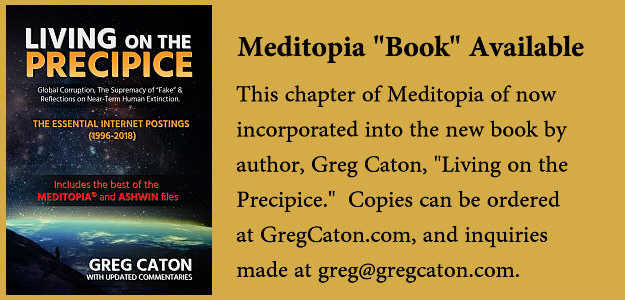
Chapter 8:
The Matrix:
As Applied to Medicine

"You've felt it your entire life. That there's
something wrong with the world. You don't know
what it is, but it's there, like a splinter in your
mind, driving you mad . . . The Matrix is everywhere.
It is all around us, even in this very room . . .
It is the world that has been pulled over your eyes
to blind you from the truth . . . a prison that
you cannot smell, or taste, or touch. A prison
for your mind."
Morpheus
The Matrix

"If you love wealth more than liberty, the tranquility
of servitude better than the animating contest of freedom,
depart from us in peace. We ask not your counsel nor your
arms. Crouch down and lick the hand that feeds you.
May your chains rest lightly upon you and may posterity
forget that you were our countrymen."
Samuel Adams (1722-1803)

" ' You have the honor of the king's favor; but you
know nothing about liberty, what relish it has
and how sweet it is. For if you had any knowledge
of it, you yourself would advise us to defend it,
not with lance and shield, but with our very
teeth and nails. ' "
Étienne De La Boétie
18
 he idea that we live in a 'land of
illusion' which provides the backdrop for our physical reality
flourishes among man's oldest religions and philosophies.
It is best known in
the East under the Vedic concept of maya, or illusion.
1 This concept becomes
anthropomorphic with the arrival of Maya as Goddess.
 From my mid-teens
I had a thorough intellectual understanding of "maya" --
largely gained through a study
of Comparative Religions. It is a recurrent theme and yet
no study of classical texts can prepare you for the realization
that the Grand Illusion is more real than you think.
At one level we can resign ourselves to the abstract concept
that everything around us is temporal; our lives are brief;
and we cannot be certain what came before or what comes after
this short walk. It seems even intuitive that we are a
"blink in the eye of Brahman," or, as Peter notes,
" . . . with the Lord one day is like a thousand years
and a thousand years like one day." --- (2 Peter 3:8 NAB)
 There are, however,
aspects of maya -- far more concrete than vague
references to time, space, or temporary circumstance --
and these are more immediate, specific, and sinister.
 When you have been
allowed to peer behind this curtain of illusion, you come
face-to-face with an indescribable certitude that,
as in the film version of the The Matrix,
you do live in a society where you are
a source of energy
(i.e. through myriad systems of taxation -- some apparent
and some quite hidden), that you do live in a form of
financial servitude that is, in Truth, the most salient
feature of so-called Western democracy, and that, in
terms more pertinent to my book,
the role of organized medicine is one of "agent," an evil
gatekeeper that attempts to prevent people from knowing
or using the true source of healing.
 That our physical
universe may be as illusory as a fist (which promptly
turns into non-existence when the hand is opened) appears
to be only the most outer skin on the cosmic onion.
A universe of illusions, like an onion, has innumerable
layers to traverse -- and once you have passed "through" them
all, you may still ask yourself, "Where is the core?"
 Aside from descending
into a universe of mirage over which we have little control,
it has been proposed
that mankind himself uses myth as a way of negotiating the hidden
meanings of the collective unconscious. "Through a dialogue
conducted with these inner forces through our dreams
and through a study of myths, we can learn to know and
come to terms with the greater horizon of our own
deeper and wiser, inward self. And analogously, the
society that cherishes and keeps its myths alive will
be nourished from the soundest, richest strata of the
human spirit."
2
 I understood these
creative forces and the power of symbolism long ago.
What I was not prepared for (and you'd never know it
to read the work of writers like Campbell) is that
our society has all powerful forces at work (at least
on this physical plane) that are not at all benign. In fact,
these forces are evil, manipulative, corrupt to a
degree that may exceed the average citizen's capacity
to comprehend.
 Organized medicine
embodies these forces, but even it, as we shall see shortly,
is but a subset of yet larger, more sinister forces.
 The outline of those
forces, in its broadest generalities, can be found in
Nicolo Machiavelli's The Prince, who describes
in terms quite comfortable to modern civilization, the ways
of acquiring and sustaining power. His words of advice,
admonition, and comfort are addressed to the tyrant.
 But another sixteenth
century writer, Étienne De La Boétie,
3 addresses
the same forces and provides advice, admonition, and
comfort to the victims of that tyrant. As such,
De La Boétie provides a libertarian framework that has proven
a source of inspiration for Thoreau, Ralph Emerson,
Tolstoy and Ghandi. He doesn't detail so much the forces
that create the dog collar -- instead, he describes
the forces that would help us understand why we would
allow it be put our around our necks in the first place.
In Book III of this work, it will
provide a source of inspiration for us as well, but
let's dissect his magnum opus first.
 Politics of Obedience Politics of Obedience
is divided into three sections, covering the following themes:
- Part I -- The fundamental political question
is why do people obey a government. The answer is that
they tend to enslave themselves, to let themselves be
governed by tyrants. Freedom from servitude comes not
from violent action, but from the refusal to serve.
Tyrants fall when the people withdraw their support.
[And this is why those in the
alternative healing community are such a threat to
the established order. They choose to withdraw their
support from a system of organized medicine that is only
intended to enslave them.] Therefore, governments
expend great energy in attempting to convince you that
YOU NEED THEM. "Legitimacy is the belief of the populace
and the [lesser] elites that rule is proper and valid,
that the political world is as it should be. It pertains
to individual rulers, to decisions, to broad policies,
to parties, and to entire forms of government. The support
that members are willing to extend to a political system
is essential for its survival."
14
To those who suggest that we live in a land of freedoms --
that if we lived under tyranny, our oppression would
be more obvious, the force of economics cures the
ignorance and provides the
answer as to the importance of the illusory veneer. "Coercion,
though, is a costly, ineffective strategy which can
never be completely or permanently successful.
Even with coercion, decline in popular support below some
critical minimum leads infallibly to political failure.
Establishing moral validity is a less costly and effective
approach."
15
(I can find no other instance of a complete lack
of moral validity than our government's support of
a system of organized medicine that suppresses effective
medical cures so that a select elite of political supporters
can make more money. That this has been going, as we saw
in Chapter 2, in its most aggregious form since the 1840's
only adds salt to the wound. In its own sick, twisted way
it is the social equivalent of Nazi death camp soldiers
rummaging through the bodies of dead Jews to extra their
gold teeth. And that is why the FDA is so strict in
helping to support this cruel veneer of illusion.
To have the truth exposed strikes at the very heart of
legitimacy of our government --- of ANY government.)
16
- Part II -- Liberty is the natural condition
of the people. Servitude, however, is fostered when
people are raised in subjection. People are trained
to adore rulers. While freedom is forgotten by many,
there are always some who will never submit.
[Might we include those who don't
want to die unnecessarily from a dangerous FDA-approved
chemotherapy treatment, so that the local hospital
and oncologists can make more money? So, instead, they
seek out natural, effective remedies?]
- Part III -- If things are to change, one
must realize the extent to which the foundation of
tyranny lies in the vast networks of corrupted people
with an interest in maintaining tyranny.
[And as it pertains to the
Medical Industrial Complex, we can see intuitively
the forces that work against giving you back your
freedom.]
 Every reformer
has a different take on how to break this cycle of
enslavement. As it pertains to reform of "health
care community," Former U.S. Presidential Candidate
for the Libertarian Party, Harry Browne, has
recommended the abolition of the FDA. "Let people
decide for themselves, with the help of their
doctors and private testing agencies they choose
for themselves, which medicines are safe enough
for them. Let people decide for themselves what
risks they're willing to take. Let people with
fatal illnesses choose any therapy they want in
hope of beating the odds. No one will be left
on his own unless he wants to be. You and
your doctor can use any testing and certification
company you want -- including one staffed by
former employees of the FDA. Let drug
manufacturers prove to you and your doctor
the safety of their drugs. That way they
won't have to run up the cost of the medicine --
as they do now to get the FDA to act."
4
 What Browne,
and reformers like him, fail to realize that
the system is endemically corrupt. You can't
change the Matrix. You can only reach the
point where you realize the importance of
becoming unplugged.
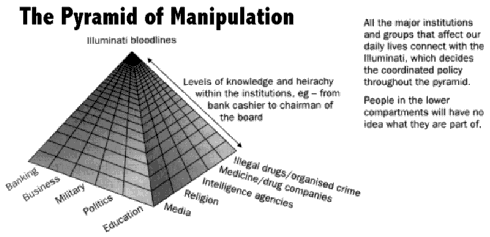
Icke's Pyramid of Manipulation
5 I didn't realize
the degree to which the system had become immutable until
I began to see correlations between the mechanics of
the system as it pertains to the alternative health care
system and those writers who have carefully, and in
great detail, documented the history, nature,
structure -- morphology, if you will -- and behavior
of the real "power elite."
 The Matrix is just
a metaphor. After all, we don't really have machines
running things. Beyond a certain point the metaphor
breaks down. Or does it? Is it possible that the system
follows a mechanistic set of rules that is so insidious,
that we might as well be governed by machines? Is it
really possible that, given the manner that our lives
are devoted to 'working the system,' (as opposed to the lives
of hunter / gatherers who work, on average, just ten to
fifteen hours per week), that the power elite could not
possibly create a system that is more parasitic than it
is now and still get away with it?
 Even if you discard,
out of hand, the leading books in this genre over the last
30 years --
Epperson
6 ,
Cooper
7 ,
Marrs
8 ,
Icke
9 ,
Desborough
10 ,
Constantine
11 ,
Keith
12 ,
and
Rappoport
13
come most immediately to mind -- you cannot help but
notice the accuracy of their collective descriptions
about "how" the system operations. You may not agree
with the causes to which they point. You may not agree
with all their specifics -- (Icke's repetitive work
on the reptilian bloodlines, taking up where Horn
17 left off,
will strike the uninitiated as over the top -- which
is why I have advised friends to read, read, and read;
accept what you are ready for and just put the rest
aside for the time being). Nonetheless, it is difficult
to argue that the net effect is not as
they portray it.
 I speak from
first-hand experience. There is a force which
enforces its "will" from above -- a will that is not
all at in accordance with what is best for the
common good.
 Becoming "unplugged,"
is, therefore, one of the first orders of priority in
attaining to Meditopia. You cannot be a free and healthy
person unless you free yourself of the Matrix -- from
within and from without.
- See http://encyclopedia.thefreedictionary.com/Maya%20(illusion)
- Joseph Campbell,
Myths to Live By, Penguin Group,
New York, 1972, p. 5.
- Étienne De La Boétie (1530-1563)
Politics
of Obedience: the discourse of voluntary servitude. De La Boétie
was a close friend of the eminent essayist, Michel de Montaigne,
and is remembered as "one of the seminal political philosophers,
not only as a founder of modern political philosophy in France
but also for the timeless relevance of many of his theoretical
insights." Translated by Harry Kurz, Black Rose Books,
Montréal, 1997, p.2.
- Harry Browne,
Why Government Doesn't Work,
St. Martin's Press, New York, 1995. p. 109.
- David Icke,
Tales from the Time Loop: The most
comprehensive exposé of the global conspiracy ever written
and all you need to know to be truly free, Bridge of Love
Publications USA, Wildwood, MO (USA), 2003. p. 45. For a list
of his previous books and latest news, visit www.davidicke.com
- Ralph Epperson,
The Unseen Hand: An Introduction
to the Conspiratorial View of History, Publius Press, Tucson, AZ,
1985. And secondly, see his
New World Order, also by Publius Press,
1990. For web references, see http://syninfo.com/Epperson/ or
http://curtisvc.tripod.com/conspiracy.htm
- William Cooper,
Behold a Pale Horse, Light
Technology Publishing, Sedona, AZ; 1991. Cooper was, by all accounts,
an unusual individual. Frankly, I don't care one whit about a person's
private life if their writings are true, complete, and accurate.
My personal belief is that Cooper's exposure to government corruption
was beyond any threshold of tolerance and he became jaded, over time,
to a level that simply pushed him over the edge. An account of the
bizarre circumstances that lead to his death at the hands of police
in 2001 is rendered at:
http://www.sierratimes.com/archive/files/nov/06/arwc110601.htm. See
also, http://www.konformist.com/2002/cooper/cooper-terror-murder.htm.
RIP: 1943-2001.
- Jim Marrs,
Rule by Secrecy, Harper-Collins
Publishers, New York, 2000. An aside: Marrs' book,
Crossfire
is the definitive, unbiased, and "unofficial" account of the
JFK assasination. It formed the basis for Oliver Stone's
film on the same subject.
- Icke, ibid. I list just this one book, because
Icke's style is such that with each new book he gives a summary
of much of the previous work. Previous volumes include:
And the Truth Shall
Set You Free,
I am Me, I Am Free,
Lifting the Veil,
Children of the Matrix,
and
The Biggest Secret.
- Brian Desborough,
They Cast No Shadows:
A Collection of Essays on the Illuminati, Revisionist History,
and Suppressed Technologies, Writers Club Press, 2002.
- Alex Constantine,
Virtual Government:
CIA Mind Control Operations in America, Feral House,
1997. Other volumes include:
Psychic Dictatorship
in the U.S.A., and
The Covert War Against Rock.
- Jim Keith,
Mind Control, World Control,
Adventures Unlimited Press (see http://www.wexclub.com/aup/usaindex.html),
1998; also
The Octopus: Secret Government and the Death
of Danny Casolaro, Feral House, Los Angeles, 2004.
(This is an updated copy). Keith died under suspicious
circumstances, though not as openly and blatantly as
Cooper. RIP: 1949-1999.
- Jon Rappoport,
The Secret Behind Secret
Societies, Truth Seeker, San Diego, California, 2003.
Several of Jon's previous works, in the same genre, are
worth reading as well, including
Ownership of All Life,
Oklahoma City Bombing,
and
AIDS, Inc.
- Joseph A. Tainter,
The Collapse of Complex Societies,
Cambridge University Press,
1988. Quoted from 2003 reprint, p. 27.
- David Easton,
A Framework for Political
Analysis, Prentice-Hall, Englewood Cliffs, NJ; 1965.
p. 220-4; as quoted in Tainter, p. 27.
- Tainter, ibid.
- Dr. Arthur David Horn with Lynette Anne Mallory-Horn,
Humanity's
Extraterrestial Origins: ET Influences on Humankind's
Biological and Cultural Evolution, A & L Horn, Lake Montezuma,
AZ (USA), 1996.
- Étienne De La Boétie, ibid. p. 63.
|
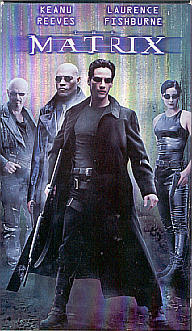
 When
The Matrix
was released in 1999, it was hailed by critics
for its riveting, eye-popping special effects.
However, apart from its contribution to pop
culture and state-of-the-art filmmaking of
the action figure variety, its use as a metaphor
for explaining how our society REALLY
works -- especially as it relates to our
relationship to an unseen power structure,
is all too evident.
 Entire
books were written, devoted just to this
one theme. David Icke's Children of the Matrix
and my late friend and one-time writing partner,
Max Skousen's, A Blessing Hitherto
Unknown (Vol. 3) are both
examples.
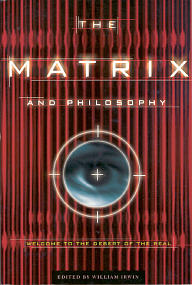
 Several good
books are already on the market which show the
degree to which The Matrix can be used
as fertile ground for metaphorical analysis
using any number of philosophical perspectives.
I particularly liked
The Matrix and Philosophy:
Welcome to the Desert of the Real.
The work is actually a compilation of
twenty different essays from varying
professors, drawing from philosophers as
diverse as Plato, Aristotle, Aquinas,
Descartes, Kant, Nietszsche, Sartre,
Sellers, Nozick, Baudrillard, and
Quine.
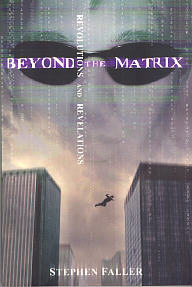
 Faller
explores the multiple layers of the Matrix and
it exists around us. His treatise is largely
experietial and it does not touch on specifics
of our political system, as Matrix, as I think
should be addressed (because it is so obvious),
but it's an enjoyable read for someone who needs
to have the initial dots connected for them.
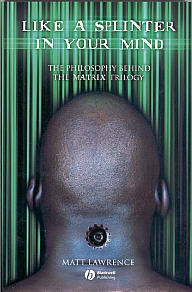
 Lawrence
examines thirteen fundamental philosophical
questions that the Matrix trilogy explores,
covering questions that are the foundation
of metaphysics, epistemology, ethics,
aesthetics, political philosophy, and
the philosophies of mind and religion.
I particularly enjoyed the chapter on
"control, free will, and causal determinism."
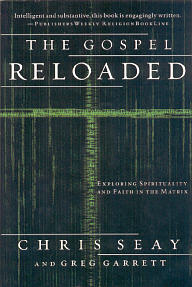
 The Gospel
Reloaded The Gospel
Reloaded plumbs the depth of spiritual
meaning in the The Matrix from the
standpoint of Christian teachings and values,
but incorporates tie-ins with other pop
culture archetypes and philosopher
thinkers, including Joseph Campbell,
John Woo, and Anime.
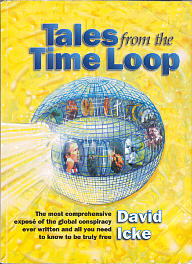
 The first
eight chapters comprise "Level One," and is
entitled, "The five-sense conspiracy."
I can't recommend this book enough -- it's
not about the movie, but it provides a
strong model, a framework, into which you
can begin to understand how the Matrix
could have gotten constructed in the first
place. It describe the intricate web of
deceptions that frame our current existence
and gives you the keys to "transforming
the illusion" and becoming truly free.
|







